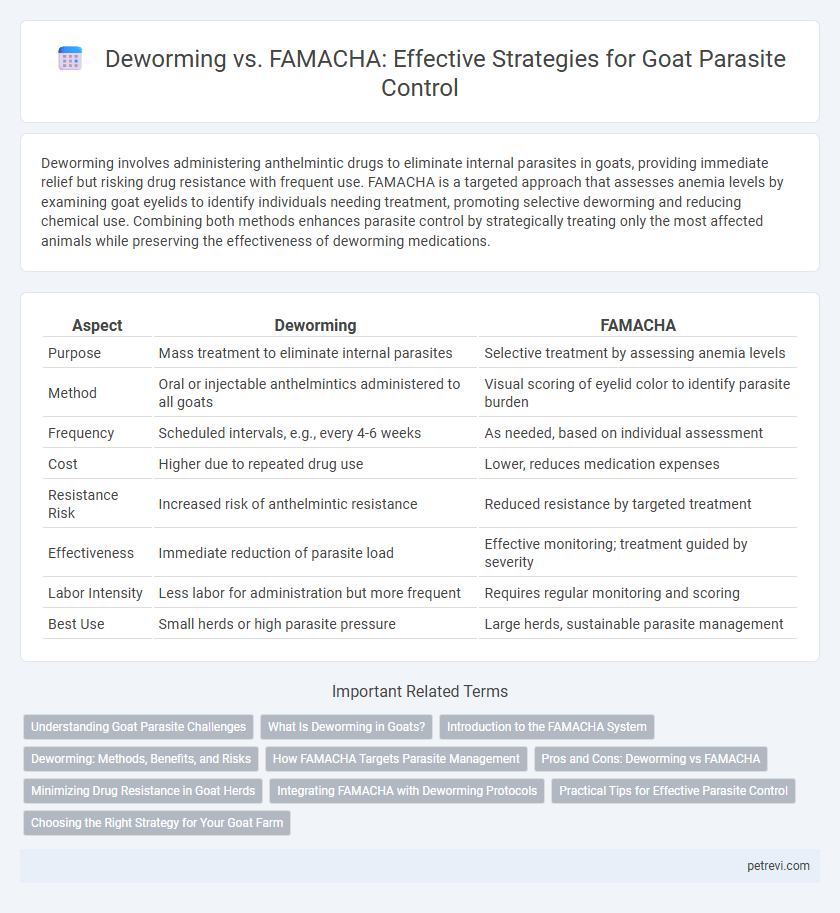Deworming involves administering anthelmintic drugs to eliminate internal parasites in goats, providing immediate relief but risking drug resistance with frequent use. FAMACHA is a targeted approach that assesses anemia levels by examining goat eyelids to identify individuals needing treatment, promoting selective deworming and reducing chemical use. Combining both methods enhances parasite control by strategically treating only the most affected animals while preserving the effectiveness of deworming medications.
Table of Comparison
| Aspect | Deworming | FAMACHA |
|---|---|---|
| Purpose | Mass treatment to eliminate internal parasites | Selective treatment by assessing anemia levels |
| Method | Oral or injectable anthelmintics administered to all goats | Visual scoring of eyelid color to identify parasite burden |
| Frequency | Scheduled intervals, e.g., every 4-6 weeks | As needed, based on individual assessment |
| Cost | Higher due to repeated drug use | Lower, reduces medication expenses |
| Resistance Risk | Increased risk of anthelmintic resistance | Reduced resistance by targeted treatment |
| Effectiveness | Immediate reduction of parasite load | Effective monitoring; treatment guided by severity |
| Labor Intensity | Less labor for administration but more frequent | Requires regular monitoring and scoring |
| Best Use | Small herds or high parasite pressure | Large herds, sustainable parasite management |
Understanding Goat Parasite Challenges
Goat parasite challenges primarily include gastrointestinal worms that cause anemia, weight loss, and reduced productivity. Deworming targets internal parasites with broad-spectrum anthelmintics but risks resistance if overused, while FAMACHA scoring assesses anemia severity to guide selective treatment, reducing drug resistance. Combining FAMACHA monitoring with strategic deworming enhances effective parasite management and supports sustainable goat health.
What Is Deworming in Goats?
Deworming in goats involves administering anthelmintic medications to eliminate internal parasites such as gastrointestinal worms. This preventive treatment is essential to maintain goat health, improve nutrient absorption, and enhance overall productivity. Regular deworming schedules, guided by fecal egg counts, help reduce parasite loads and prevent resistance development.
Introduction to the FAMACHA System
The FAMACHA system is a targeted selective treatment method developed to control barber pole worm (Haemonchus contortus) infestations in goats by assessing the anemia level through the color of the conjunctiva. This approach minimizes the overuse of dewormers and slows down the development of anthelmintic resistance by treating only goats that show signs of significant parasite burden. Regular monitoring using FAMACHA scores enables precise identification of goats requiring deworming, optimizing parasite management and improving herd health.
Deworming: Methods, Benefits, and Risks
Deworming in goats involves administering anthelmintic drugs such as ivermectin, fenbendazole, or albendazole to eliminate internal parasites like Haemonchus contortus. Benefits include rapid reduction of worm burden, improved weight gain, and enhanced overall health, but risks involve the development of drug-resistant parasite strains and potential toxicity if misused. Effective parasite control requires strategic dosing intervals, proper drug rotation, and monitoring to minimize resistance and maximize goat productivity.
How FAMACHA Targets Parasite Management
FAMACHA is a targeted parasite management tool that assesses anemia levels in goats by examining the mucous membranes, helping identify those most affected by Haemonchus contortus, a blood-sucking parasite. This method enables selective deworming, reducing drug resistance and preserving healthy parasites by only treating goats showing clinical signs of infection. By focusing on accurate, individualized treatment, FAMACHA improves the effectiveness of parasite control compared to routine blanket deworming.
Pros and Cons: Deworming vs FAMACHA
Deworming offers broad-spectrum parasite control in goats, effectively reducing worm burdens but risks leading to anthelmintic resistance with frequent use. FAMACHA scoring provides a targeted approach by assessing anemia levels to identify individuals needing treatment, conserving dewormer efficacy and minimizing drug costs. However, FAMACHA requires regular monitoring and training, and its effectiveness is limited to detecting specific parasites like Haemonchus contortus, unlike deworming which treats a wider range of parasites.
Minimizing Drug Resistance in Goat Herds
Regular deworming of goats is essential for parasite control but frequent use of anthelmintics can accelerate drug resistance in parasite populations. The FAMACHA system allows for selective treatment by evaluating anemia levels in goats, targeting only those severely affected by parasites and thus reducing unnecessary drug administration. Integrating FAMACHA monitoring with strategic deworming protocols helps maintain drug efficacy and minimizes the development of resistant gastrointestinal nematodes in goat herds.
Integrating FAMACHA with Deworming Protocols
Integrating FAMACHA scoring with deworming protocols enhances targeted parasite control in goats by identifying anemia levels linked to Haemonchus contortus infestations. This approach reduces the overuse of anthelmintics, slowing resistance development while maintaining herd health. Regular FAMACHA assessments combined with strategic deworming optimize parasite management and improve overall goat productivity.
Practical Tips for Effective Parasite Control
Regular deworming schedules combined with FAMACHA scoring significantly improve parasite control in goats by targeting treatment only to those animals showing signs of anemia, thereby reducing drug resistance. Monitoring goats weekly using FAMACHA cards helps identify individuals with high parasite loads, allowing for timely interventions. Implementing rotational grazing alongside selective deworming practices enhances pasture management and lowers overall parasite exposure.
Choosing the Right Strategy for Your Goat Farm
Effective parasite control in goat farming hinges on choosing between routine deworming and FAMACHA scoring based on your herd's specific parasite load and resistance patterns. Deworming offers broad-spectrum parasite elimination but risks accelerating drug resistance if overused, while FAMACHA targets treatment only to goats showing clinical signs of anemia caused by Haemonchus contortus, preserving anthelmintic efficacy. Implementing integrated parasite management combining regular FAMACHA assessments with strategic deworming maximizes herd health, reduces drug resistance, and supports sustainable goat farming practices.
Deworming vs FAMACHA for Goat parasite control Infographic

 petrevi.com
petrevi.com